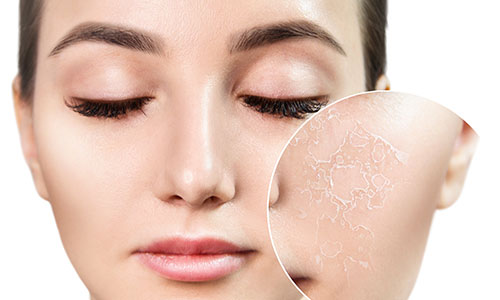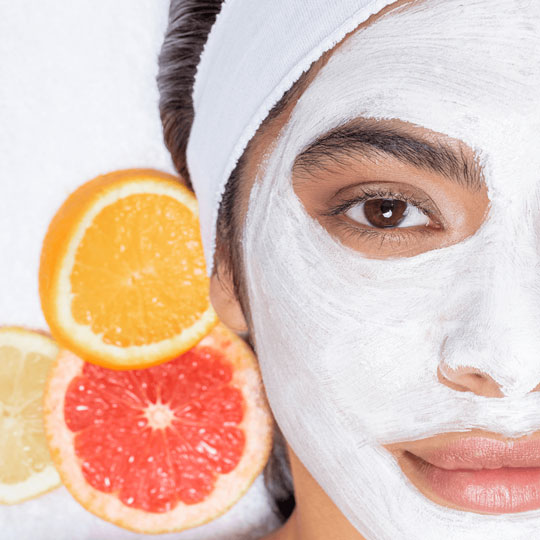When your skin starts losing moisture and water, the protective outer and uppermost layer of the skin starts to feel the effects of dehydration. That’s because on an average, our skin is 60% of water, so keeping this balance is so important. Every day our skin loses water to the harsh sun - it’s totally normal! When your skin loses more water than it needs, it starts to show on your skin.
While dry skin which is caused by a lack of oil and dehydrated skin caused by lack of water, cause almost the same skin issues: tightness, roughness, flaking, scaling, rashes, inflammation, redness and itching, they are two different skin problems, and therefore need different types of treatment.
Our everyday lifestyle and certain inescapable factors can take a toll on your skin causing it to be dehydrated. The moisture of the face can be sucked out by indoor air-conditioning and sudden temperature fluctuations, consuming more cups of caffeine than water, severely hot showers and of course, forgetting to maintain your gentle skincare routine.
While nature has given us the gift of water in abundance, it should be used to achieve effortlessly fresh, hydrated, and blemish-free skin.
GET IN TOUCH WITH US NOW
The reasons for skin dehydration:
Many external factors can cause the skin to dehydrate and take a daily dose on your skin:
- A combination of the sun, harsh cleaning agents and chemicals
- Poor lifestyle choices such as not getting enough sleep or smoking
- Harsh weather conditions
- Poorly planned diets and overconsumption of fatty and sugary foods
These factors gradually strip-off the skin’s lipid and weaken the cells, causing the skin to be dry and flaky. Due to dry skin, skin starts appearing duller day by day.
Skin dehydration signs to watch for:
- Sudden appearance of fine lines
- Reducing or greying skin tone
- Dulling complexion
- Itchy skin
- Red scars
- Uneven Skin Tone

How do you replenish your dehydrated skin?
An effortless and straight forward method would be to drink plenty of water and keep yourself hydrated. Doctors recommend a daily intake of water depending on weather, sun exposure, and lifestyle choices.
Our expert skin consultants in the UAE, examine the skin for all the effects that have caused skin dehydration, to help devise a customised plan for you with the help of a proper skin routine, nourishment and supplements.
A proper skincare routine with all the elements that are crucial for your skin, can yield extremely remarkable results. Our expert consultants will explain more about How to Hydrate Your Skin, using food, emollients, moisturizers, and sunscreens, that suit your skin type.
Moreover, diet plans, exercise, yoga, and facials recommended by our experts will speed up the whole process to help transition your skin into a smoother and hydrated appearance.
How to test if your skin is dehydrated:
There are some definite signals that reveal if you have dehydrated skin, based on sight and touch. Try ticking the ones you can immediately notice:
Does your skin feel:
- Sensitive
- Tight
- Dry
- Rough
- Itchy
Does your skin show the following:
- Dull or pale
- Sunken Eyes
- Fine lines & surface wrinkles
- Flaky
- Scaly
- Reddish

How to treat your dehydrated skin
- Drink at least 8 glasses of water in a day! Aim for 2 litres a day and liven it up with refreshing combinations such as mint and lemon. Alternatively, you can even go in for a mug of hot water, ginger, and lemon to have a more versatile spread. To ensure your skin has its quenching of 60% water, try also eating more water-rich foods. We are talking green veggies and fruits the likes of watermelon, cucumbers, bananas, strawberries, spinach, iceberg lettuce, radishes, and celery. It just balances your diet
- Omega is mega good! Each skin cell membrane is made up of omega fatty acids, which contribute to healthy, hydrated skin. They work at a deeper cellular level from when cells are formed, so the best way to get this going is feeding on foods rich with Omega 3 from eggs to fish.
- Increase the humidity! Air-conditioning is often the culprit behind dehydrated skin on your face and body. They dry the air around, sapping water from our skin. What is required is more moisture in the air, to ensure less water evaporates from your skin. Why do you think your skin always looks so much better on a sweaty summer holiday?
- Stay hydrated when travelling! Watch out: Dry air, low humidity levels and air-conditioning from airports and flight cabins, can easily upset your skin’s moisture balance. Avoid the signs of dehydrated skin on your holiday by layering up with moisture-rich creams before you fly.
How is water regulated in skin?
Nearly 60% to 75% of water exists deep down in the dermis where it plays an important role in the skin’s strength and resistance to external, harsh factors.
There are 2 elements that moisturise the epidermis:
- Static water, which is fixed
- Dynamic water, which circulates
A process of ‘Hydroregulation’ maintains a natural balance between static water and dynamic water providing the skin’s overall physical and functional integrity.
Your skin has a water-holding capacity that contributes to its elasticity and helps maintain the body's balance of fluid and electrolytes. When it comes to maintaining your body temperature, when your body is hot, tiny blood vessels in the skin enlarge, permitting internal heat to escape through a process called radiation.
Watch out: Dry air, low humidity levels and air-conditioning from airports and flight cabins, can easily upset your skin’s moisture balance. Avoid the signs of dehydrated skin on your holiday by layering up with moisture-rich creams before you fly.
When should you contact a doctor for skin dehydration?
Dehydrated skin occurs because your body is losing more water than it is absorbing. This happens when you are not drinking the required daily intake of water required. Excessive sweating can also cause you to lose a lot of water, leading to skin dehydration.
If your skin is dehydrated, you will immediately experience itchiness, dullness, dark circles under eyes, and wrinkles and fine lines. Extreme symptoms may include dizziness, dry mouth, or nausea. One quick way to find out if you have dehydrated skin is to pinch a small area of your cheek. If it wrinkles, your skin needs hydration. Fortunately, regular and severe dehydration can be treated.
Dehydrated Skin Treatment in Dubai
Talk to our expert skin consultants in the UAE for the best treatment in dehydrated skin in Dubai. They can help devise a customised plan for you with the help of a proper skin routine, nourishment and supplements.


